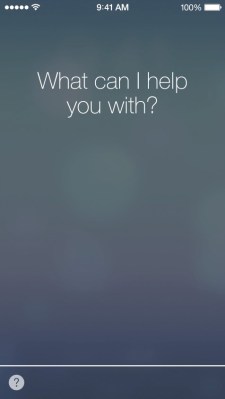 Simplicity is the ultimate sophistication.
Simplicity is the ultimate sophistication.
And if simplicity is the ultimate sophistication, iOS 7 is very, very sophisticated.
The most powerful man in the room doesn’t need a loud voice. The securely rich don’t need to flaunt their wealth. The cool kids are the ones who aren’t trying to be cool. The truly elegant realize that understatement is the essence of sophistication.
And the ultimate interface is the least obvious to the user.
The latest version of iOS is the culmination of Apple’s six-year journey with iPhone, and that journey mirrors the changes that successfully brought Apple back from the brink of death in the late 1990s. The product that saved Apple was the iMac, and Steve Jobs threw it like a grenade into the the computer industry. Where the industry was grey, iMac was color. Where the industry was separate pieces wired together, iMac was unified and singular. Where the industry was opaque, iMac was translucent.
But the original iMac was also a little childish — a little young — before it became the singular objét d’art that it is today. And like iMac’s 15-year transition from fruity to elegant, iOS has now crossed the user interface Rubicon from Microsoft Bob to the Bauhaus — from decoration to design.
Versions 1 through 6 were Apple’s mobile juvenilia; iOS 7 is Apple at the zenith of its design zen.
Less inter, more face
By definition, an interface is a bridge. A connection. Something that takes one thing and attaches it to another. A user interface takes what we want out of the machine and supplies it to us in a format we can see, understand, and use.
Glancing back at former iOS versions after using iOS 7 is an interesting experiment. As revolutionary, incredible, and praised as it was, old iOS seems obvious, heavy-handed, and almost crude in comparison. Buttons are massive, messy objects that just beg to be interpreted as old-world meatspace buttons that physically depress with a ker-thunk! as you hit them. Borders surround chunks of information like arm-in-arm security staff holding back the outside world from some very exclusive event.
Now, iOS 7 is much more authentically digital and much less representationally physical.
We’ve all grown up, Apple is saying, and we no longer need these real-world touchable referents in order to understand digital information. And, in fact, they’re holding us back, restraining us and surrounding the content we want with gimmick and gewgaw.
Who among us has ever used a rolodex? Do you keep a pad of paper handy at all times to jot down notes with pen and ink? Do we really need green felt, as Apple’s Federighi joked about in the recent WWDC keynote, to make us think of games and fun? And do we all have smoking jackets, cee-gars, and snifters brimming with brandy as we amble back to the snooker table, one hand in our houndstooth jackets?
No, no, and no.
One of the key values in iOS 7, Apple says, is deference. The user interface is there to help users get, understand, and work with the data and information they want, not to compete with it. Interface should be underneath, Apple is saying. It’s kingmaker, not king; servant, not master. Background, not foreground.
Elegant doesn’t mean somber
In spite of its elegance, iOS 7 isn’t standoffish or unapproachable. Not dark and distant.
Rather — and this is why some have likened it to Windows Phone and the new Windows design language — iOS 7 is light, approachable, even colorful in places. In other words, Apple’s not trying for an affect here. It’s not trying so hard to make iOS the nth degree in haute couture so that it becomes elitist or arrogant. Rather, Apple is looking for the best way to present and offer up experiences enabled by the device in your hand — a style so unstyled it’s not really a style but an expression of humility to the text, images, data, voices, and fun that will flow through to the user.
And that’s done in living color.
Minimalism is sometimes very minimal
While I’m happy with Apple’s overall direction, let’s keep in mind that this is a beta operating system and not a universally released, fully available product. And there’s room for improvement.
Minimalism is a language that not everyone speaks, and sometimes less is just … less.
Just one example is in Apple’s phone app, which indicates that yes, you are on speaker mode with a very subtle light effect under the volume icon. It’s not nearly as obvious as iOS 6’s speaker mode — which is the point, after all — but the question is, is it obvious enough?
In other words, can you be so simple, so restrained, and so tentative in what you put into your user interface that you’re actually increasing the cognitive load on your users?
In a word, yes, and I think that there are some in the iPhone user camp who are going to be astonished but not delighted with some elements of the new operating system. Microsoft is going through its own challenges as users are being forced through a massive update in its desktop design language, and I think Apple will see something similar.
Going somewhere good
That said, I like iOS 7. In fact, I really, really like iOS 7.
I have been using it for the better part of a week now, and despite the bugginess inherent in a beta operating system (sometimes the phone app hangs, sharing photos and videos doesn’t work in all cases, and so on), I would not go back.
We give bright, noisy toys to kids to hold their attention, and juveniles drive loud, flashy cars to reinforce the image of themselves that they desire to project, but we don’t need that.
We’re all grown up — mostly — and we know that simplicity is the core of sophistication.
Apple knew that back in the 1970s, when Steve Jobs adopted that as one of the company’s marketing slogans. Leonardo da Vinci knew it when he first said it.
And, I think, most Apple fans know it, too.
Image credits: Most: Brian Roizen, top, John Koetsier
VentureBeat's mission is to be a digital town square for technical decision-makers to gain knowledge about transformative enterprise technology and transact. Learn More





